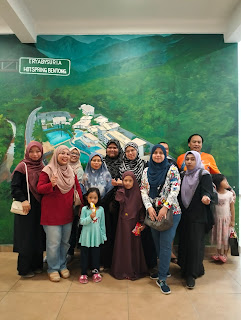|
On 7th
December 2024, a group comprising 14 engineering students and 6 lecturers
visited the ESG (ENVIRONMENTAL, SOCIAL, AND GOVERNANCE) Centre in Kuala Lumpur.
The visit aimed to enhance participants’ understanding of sustainable practices
and governance principles, providing an invaluable opportunity for experiential
learning. It’s aligned with EAC 2024 manual that emphasize the requirement of
sustainability knowledge and assessment within the courses and program.
The
presentation during the visit was conducted by Haji Ismail bin Abdullah,
President and Chief Sustainability Officer (CSO) of International Green Trends
Cockpit (IGTC) Sdn. Bhd. His expertise and approachable manner significantly
enhanced the learning experience for all participants. The ESG
Centre was conceptualized by YBhg. Datuk Seri PMgr Sr Haji Kamarulzaman Bin Mat
Salleh, the Mayor of Kuala Lumpur, as a demonstration of DBKL's (Kuala Lumpur
City Hall) commitment to global sustainability and support for ESG frameworks.
The Centre was officiated by YB Dr. Zaliha Binti Mustafa, the Minister in the
Prime Minister's Department (Federal Territories), on 1st August 2024. The Center's
key roles include serving as a reference hub for ESG programs, providing
up-to-date insights on carbon reduction initiatives, and acting as the first
"Sustainability Insights" center established by local authorities and
government agencies. Additionally, it mentions its role in greenhouse gas
inventory management, facilitating stakeholder relations, and encouraging
self-learning through its design and circulation concepts. This infographic is
visually appealing, combining simple text with dotted illustrations that
emphasize its diverse contributions to ESG efforts. The ESG Centre Kuala
Lumpur is designed as a comprehensive hub for advancing sustainability and
governance practices. Its concept revolves around: 1. Sustainability Insights:
Acting as the first "Sustainability Insights" centre established by
local authorities and government agencies, the Centre offers expert knowledge
and data on sustainability challenges and solutions. 2. Educational Platform:
Providing self-learning opportunities through interactive exhibitions,
workshops, and digital resources that promote a deeper understanding of ESG
principles. 3. Carbon Reduction Initiatives:
Serving as a dissemination center for information and initiatives related to
carbon reduction, climate change adaptation, and environmental stewardship. 4. Collaboration
Network:
Facilitating connections between corporations, government agencies, and
community organizations to support ESG-driven collaborations and partnerships. 5. Data and Research Hub:
Housing resources like the Greenhouse Gas Inventory Management System (GIMS),
which supports transparent reporting and research in ESG compliance. 6. Innovative Design: Incorporating a forward-thinking
architectural concept that emphasizes functionality, circulation, and a
learning-friendly environment for visitors and stakeholders. The
educational visit to the ESG Centre provided multiple benefits for both
students and lecturers: 1.
Enhanced Knowledge of ESG Principles Participants
gained a deeper understanding of the core elements of ESG—environmental
responsibility, social equity, and governance transparency—and their relevance
to various industries. 2.
Practical Exposure Through
interactive sessions and case studies, students and lecturers were exposed to
real-world applications of ESG practices, such as carbon footprint reduction,
ethical labor practices, and corporate governance models. 3. Skill
Development Students
enhanced their critical thinking, problem-solving, and collaborative skills by
engaging in group discussions and activities led by the Centre’s experts. 4.
Networking Opportunities The visit
facilitated connections with professionals and organizations committed to
sustainability, providing potential opportunities for internships and future
collaborations. 5.
Inspiration for Academic and Career Paths Lecturers and
students were inspired to incorporate ESG themes into their academic projects,
teaching methodologies, and career aspirations, fostering a generation equipped
to address sustainability challenges. The visit to
the ESG Centre Kuala Lumpur was a highly enriching experience, equipping
participants with valuable insights into sustainable practices and ethical
governance. It underscored the importance of integrating ESG principles into
both personal and professional domains, preparing students to be proactive
contributors to a sustainable future. This educational experience will
undoubtedly have a lasting impact on all participants, reinforcing the critical
role of education in driving meaningful change.
|














































